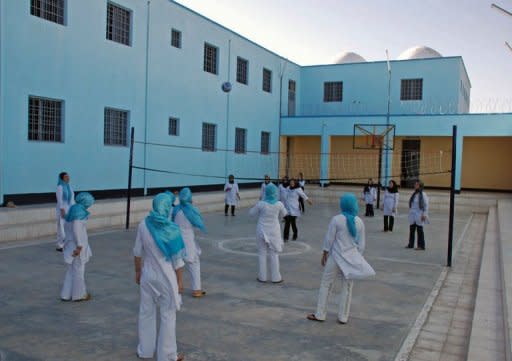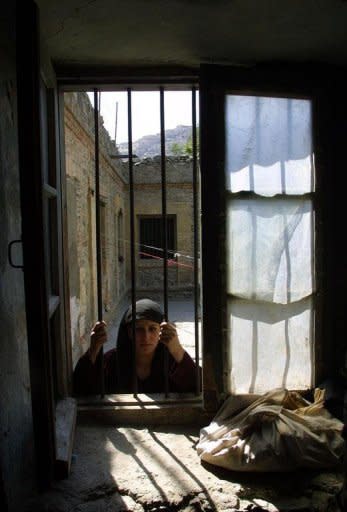Afghan women jailed for 'moral crimes': rights group
Hundreds of Afghan women are languishing in prison for so-called moral crimes, which include running away from home and having sex outside marriage, campaign group Human Rights Watch said Wednesday. The report released in Kabul, "I Had to Run Away", called for them to be freed and said President Hamid Karzai's Western-backed government had failed to fulfil its obligations under international human rights laws. "It is shocking that 10 years after the overthrow of the Taliban, women and girls are still imprisoned for running away from domestic violence or forced marriage," said Kenneth Roth, executive director of Human Rights Watch. The group estimated there are a total of 400 women in prison and girls in juvenile detention facilities having been accused or convicted of offences including "running away", which is not a crime under the Afghan penal code. "Some women and girls have been convicted of zina -- sex outside of marriage -- after being raped or forced into prostitution," it added. "Judges often convict solely on the basis of 'confessions' given in the absence of lawyers and 'signed' without having been read to women who cannot read or write. After conviction, women routinely face long prison sentences, in some cases more than 10 years." In a deeply conservative society many of the 58 inmates interviewed for the report expressed fears that they could be murdered by their families for reasons of "honour" after they were released. HRW quoted one 17-year-old inmate named as Khalida P, imprisoned for running away with a boy her parents had forbidden her to marry, as saying: "My parents come every week on visiting day. Every time they tell me that very soon they will pay the prison staff to give me to them, and then they will kill me." The report also cited a woman sentenced to three years in prison after fleeing a father-in-law who raped her and had her brother murdered as saying: "I am happy in here. Here I am not afraid because I know no-one is coming in the night to kill me." Karzai has regularly issued pardons for women convicted of "moral crimes", but HRW researcher Heather Barr said: "It's nice that he does this but it doesn't make up for something that's an injustice in the first place. "It doesn't give you back the months or years you have spent in prison, it doesn't change the fact that so many of these women and girls are at risk of honour killings because they have been convicted of these crimes." The position of women in Afghanistan has improved dramatically since the fall of the Taliban, with the number of girls in education soaring. But as the Americans and the Afghan government have pursued peace efforts with the Taliban, women are increasingly concerned that gains in their rights may be compromised in a bid to end the costly and deadly war. This month Karzai endorsed an edict by the Ulema Council, the country's highest Islamic authority, saying that women were worth less than men. It said women should avoid "mingling with strange men in various social activities such as education, in bazaars, in offices and other aspects of life", effectively implying that women should not go to university or to work. It also stated that "teasing, harassing and beating women" was prohibited "without a sharia-compliant reason" -- leaving open the suggestion that in some circumstances, domestic abuse was appropriate. Barr said that with the West preparing to scale down its presence in Afghanistan, Karzai was looking to "put a more conservative foot forward" and send signals to both the Taliban and powerful traditionalist Afghans "as he tries to assess how he's going to survive the next couple of years". Karzai's spokesman Aimal Faizi played down the HRW report. "Over the past decade conditions for women have significantly improved," he said. "The constitution and other laws of Afghanistan defend the rights of women." But he added: "We can't deny there still are problems faced by women, Afghanistan is a war-torn country."



